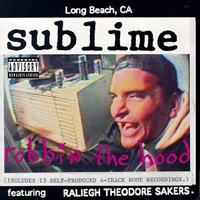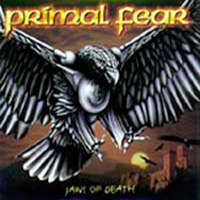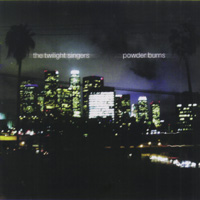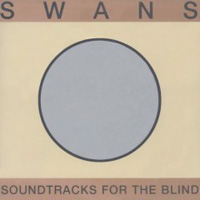 Swans
Swans
Soundtracks For the Blind (Young God)
An interview with Gira
by Nik Rainey
Swans have stuck their necks out for the last time. After fifteen years of being one of the most feared, loathed, and misunderstood (when not completely ignored) bands of the indie world, via powerful testaments ranging from the unrelenting pound of albums like Filth (1982) and Holy Money (1986) to the quieter storm introduced on the classic double-album Children of God (1987) and explorations and experiments in found sound and faster tempos as laid out on White Light from the Mouth of Infinity (1992) and The Great Annihilator (1995), founding member and bandleader Michael Gira has decided to dismantle the ungodly machinery he created at the conclusion of Swans’ current valedictory/maledictory world tour in support of their final album, Soundtracks for the Blind (Young God). The CD (like the tour) is a grand, epic summation of Swans’ decade-and-a-half of squalor, pain, and purity, a two and a half hour exploration touching on long, mantric meditations, screaming slashes of punk, psychedelic tangents and languid, static drones. It could well be their greatest achievement, seemingly miles removed from the slo-mo squall they’re most (in)famous for, but every bit in line with the concentrated, singular vision of its creator. A worthy epitaph.
Those who have witnessed Gira on stage, stripped to the waist and drooling with intensity, may be surprised to hear tell of the man I met in a cold dressing room at the Somerville Theatre the night of their final Boston show. I (who should know better than to confuse the art with the man) expected a cold, standoffish hell-fiend, barking out derisive answers to my foolish, obvious questions. Instead, I got a friendly, sincere gentleman with a firm handshake and an unnerving tendency to (gasp) laugh easily and frequently. (His first words to me were, “You didn’t bring a space heater with you, did you?”) No verbal scythes, no withering glares, though I did notice that the combination on his suitcase was 666 (and I don’t imagine it was a Pulp Fiction reference). Some white light from the mouth of Gira follows.
Let’s get the obvious question out of the way – why are you disbanding Swans, in name at least?
Because other than this last, kind of funereal tour, where we’ve been drawing huge audiences, it’s been a pretty thankless task these fifteen years. The name seems to be more of a hindrance than a help in most cases. For instance, in New York, there was this pick in the Village Voice that literally said that we carried the banner of no wave all these years, which is absolutely not what Swans is about, especially now. They may as well have said, “if you want to have a miserable time, go see Swans.” We still tend to be thought of only as dark, brooding, ugly, whatever, and it’s just so limiting. And I’ll probably always be saddled with that when I go ahead and do other stuff, but (retiring the name) kind of frees my brain up a little bit and takes the onus away. And like I say, it’s been about fifteen years of putting every ounce of myself into something and I really don’t have much to show for it. I mean, I make a living, but I wouldn’t call it a decent one. I had $300 in my pocket when I left Austin, that’s all my assets right there. I sometimes wish that when I was a young man I’d have gone to school and gotten that degree (smiles).
But still you continue doing it. I always had the impression that you do what you do not for money or fame, but because you had to. Is that fair to say?
Yeah, sure. That’s the case with most writers or artists, I think. I really can’t imagine myself doing anything in life other than writing. Used to be I thought I was going to be a visual artist. Then punk rock happened and it just sort of, um…
Galvanized you?
…mangled my brain. (laughs)
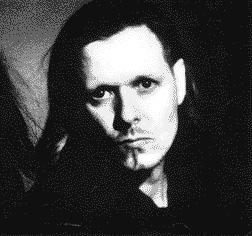 Do you intend to work with Jarboe (the Swans’ keyboardist/vocalist and Gira’s significant other since 1985) in your future projects?
Do you intend to work with Jarboe (the Swans’ keyboardist/vocalist and Gira’s significant other since 1985) in your future projects?
In a more limited way. It puts a tremendous strain on our relationship, largely because I’m such a caustic dictator. I don’t think I have the ability to separate our personal life from our work.
Musically, it works, though. Her voice contrasts well with yours.
I discovered early on that she was a very valuable foil, besides being great on her own. But she’s gonna go on, work with several people on projects that I’ll release on our label. We’re also putting out a compilation of her solo stuff as well.
So you’re reissuing Swans’ entire back catalogue on Young God?
Yeah, as double CDs. I’m getting rid of the stuff that embarrasses me and keeping the stuff I like.
For example?
Actually, most of the stuff is pretty good, but I’m a little skeptical or ambivalent about the period from about ’89 to ’92-’93 – The Burning World, the “Love Will Tear Us Apart” single, White Light, and Love of Life. Those latter two are pretty good records – there’s a few things I want to cut from them – but I’m going to make a double CD that takes the best songs from Burning World (“God Damn the Sun” and “I Remember You Well”) and a couple of the B-sides from “Love…,” including Jarboe’s version which is much better than mine, put them together with Love of Life and White Light… and a few things from the World of Skin album we did in the nineties (Ten Songs From Another World) and make a really good double CD out of that. The others will stay essentially intact and I’ll add bonus tracks where I can.
How does it feel to hear your early stuff now, things like Filth and Cop? How do you find you’ve changed since when they were recorded?
Well, I’m fifteen years older, for starters (chuckles).
Take your writing, for example. Reading The Consumer and comparing the earlier pieces in the back of the book with your more recent ones, there’s a very clear progression there.
Sure. The recent ones are more narrative pieces, more crafted, whereas the earlier ones were more vignettes, just little situations – dryer, more violent, maybe. It takes me longer to write them now, way too long. The most recent one I’ve written, called “My Birth,” is about six pages long and took me two, three weeks, eight hours a day, to write. It doesn’t come easy to me.
I’ve noticed that, starting around the late eighties, a lot of religious imagery has crept into your writing, both within and without your songs.
Yeah. The first song I started doing that with was “A Hanging” (from the Greed EP), and that was actually about autoeroticism, young boys hanging themselves while masturbating. (pause, then laughter) You know, I kind of thought of it as a sort of religious experience, that moment of orgasm. And when Children of God happened, I was watching a lot of Jerry Falwell and Jimmy Swaggart on television, and I was enthralled by what great rock performers they are! So I started taking down a lot of what they were saying and incorporating it. There’re a lot of obvious parallels between rock and religion – rock concerts are kind of a haint, I find. But I didn’t want to disparage or be cynical or snide about Christians. That’s a little too obvious, and there’s this core of Christianity which is pretty great. So I kept it ambivalent, not denouncing it but using the power inherent in that language to make a transformative experience, but one that isn’t necessarily dogmatic. And of course I think a lot about death and what it means to be alive and that all comes out in the writing.
What do you think about bands like Nine Inch Nails, Marilyn Manson, etc. that have popularized a lot of the subject matter that you’ve introduced to rock music?
The packaging, too, in the case of Nine Inch Nails… I don’t know, I don’t think it diminishes what I do. I mean I think Nine Inch Nails is okay, he’s a good producer, but I don’t really listen to that kind of stuff. It’s good for a couple of listens, maybe, then I turn it off. Marilyn Manson I just think is funny. The videos are taking on this very stylized, uniform look, you may have noticed, like his video looks like the “Closer” video and they all look like Peter Wittken photographs with Jean-Paul Gautier fashion schemes… I wonder what Wittken must think of all that.
So what are you listening to these days?
A lot of things, whatever passes my way. Everything from Tom Waits, Bob Dylan, John Lennon, Pink Floyd and Nico to more recent stuff like Low, Lambchop, Panasonic, Gastr del Sol… I tend to like stuff that’s sonically interesting but has some kind of emotional intensity to it. In the van I’ll listen to Hank Williams… Howlin’ Wolf is a constant favorite of mine. Big influence on early Swans. One of the things I admire about him, other than the fact that he was just out of control (laughs), was his ability to sing from his throat and within one note just go from this scratchy voice into a deep tenor, like an opera singer. Just amazing.
Yeah, I remember you once remarking that you’d rather listen to Howlin’ Wolf than John Cage.
Any day. I’ve never been a big fan of John Cage. I think that’s one case where the intellectual conception of the music is more important than how it sounds, and I’m just not interested in that. I’ve also been listening to a lot of stuff from Table of the Elements, this experimental label that’s been releasing stuff by Tony Conrad, Faust, Keiji Haino… and that new Vic Chesnutt album is pretty great, too.
I understand you have a couple of different post-Swans projects in the works as well.
Yeah, one of them’s called The Body Lovers, and that’s going to be one 78-minute track per CD of long sonic mutations, going from, say, a rhythm track from an old Swans record all mutilated and changed, bleeding into live musicians and found sounds, taking a lot of different source material and collaging it, running it backwards, processing it and so on. More pasting than recording. So I’m going to do a few CDs of that, and then I’m working on more of a band project called The Pleasure Seekers, which is going be quiet, acoustic stuff with a bit of ambience, but more narrative in form.
Are there any questions you haven’t been asked that you’d like to answer?
No, not really. I’m not really very talkative. So nothing, except to say that this guy (holds up a copy of James Ellroy’s My Dark Places) is a great writer. American Tabloid is a fantastic book! Every character is so corrupt you can’t believe it! None of his characters are pure, they’re all evil! And the language is like “DAdada!…DA! DA! DAdada!” No complete sentences, like Céline or something! It’s wonderful, just complete vile excess!
And you like that, huh? Gosh, I’m surprised.

